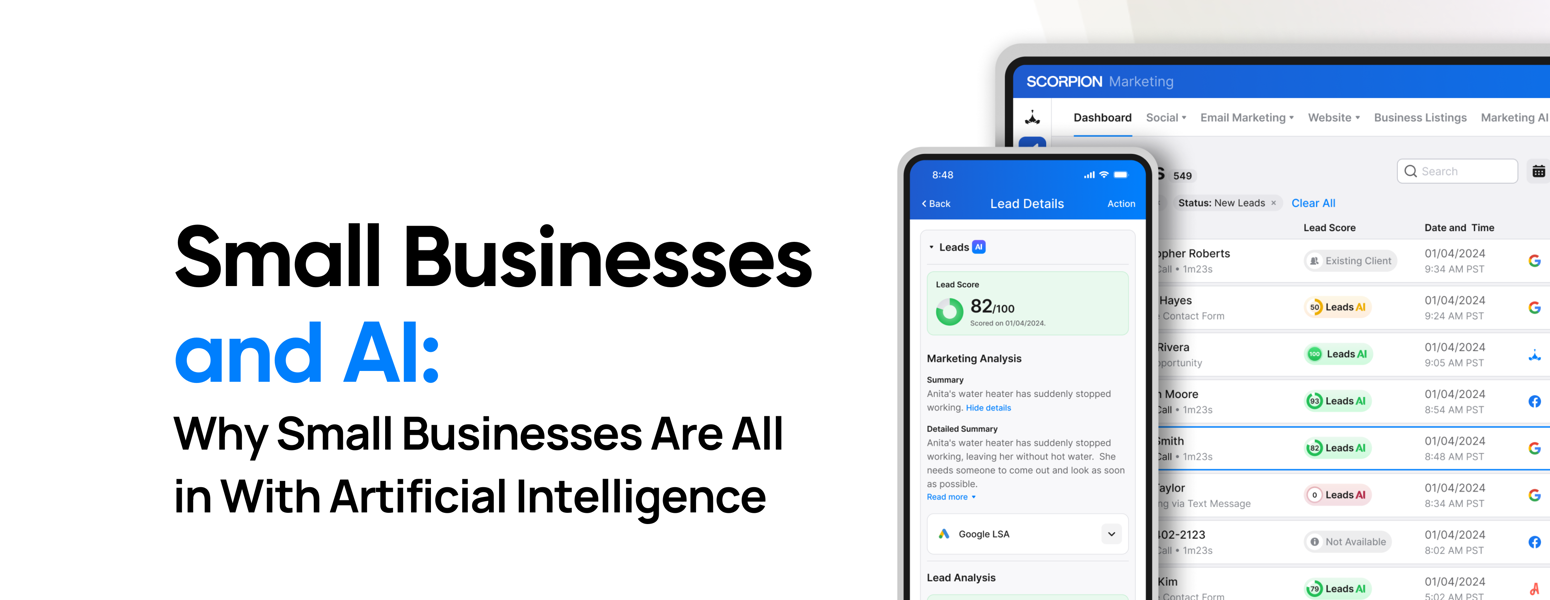Updated: June 2024
For the last 10 years, big tech companies like Adobe, Microsoft, Salesforce, and Google have talked about “digital transformation.” The concept focuses on moving old systems into the digital and virtual worlds. Artificial intelligence (AI) drives business growth by automating marketing and operations.
Digital transformation has accelerated rapidly in recent times. While large corporations have primarily led this shift, small businesses, which make up 99.9% of all businesses in the U.S., are also facing the need for transformation.
New research shows that 54% of SMBs plan to spend more on technology in the short-term future. In addition, 70% of businesses with 100+ employees plan to invest more in technology and AI marketing tools.
Artificial intelligence, once only available to large tech companies, is also making its way to small businesses with tools like Google's Gemini and OpenAI's ChatGPT.
Google and OpenAI have mass appeal and industry-specific AI tools are emerging that specialize in certain areas of business. For example, Scorpion's AI Chat helps small local businesses in industries like home services and legal be available to respond to inquiries around the clock.
Businesses that have used Scorpion's AI Chat saw a 30% increase in web conversion in just 20 days. Contact us today to find out if our AI marketing tools and technology are right for your business.
AI for Small Business Marketing: Why Are Small Businesses Investing in Technology and Digital Transformation?
With the increased demand for talent, small businesses that use AI are largely focused on keeping their employees productive and happy. As a result, 36% of small businesses said they intend to invest in their AI marketing strategy to improve employee productivity. It can also be a great way to reduce costs through automation, scheduling, payment systems, and other technology.
Putting Customers First: A Path to Digital Transformation with AI Marketing
Businesses investing in AI tech also prioritize customer service.Customers want to be able to schedule appointments online, see the cost of services, and check out reviews. And most want it all immediately. If you don't answer your phone or you can't schedule appointments over text message, you may create a negative customer experience and lose potential customers.
How Investing in AI Technology Benefits Small Businesses
When small businesses (or any business for that matter) invest in AI technology, they expect it to improve efficiency, enhance offerings, facilitate connections with customers, and increase ROI. When it comes to digital marketing goals, small businesses often prioritize attracting new customers and making data-driven decisions to optimize financial management.. At Scorpion, our marketing experts excel in both of these areas and are ready to help.
For many small businesses, digital transformation is just the first step toward reaching their goals. After using AI for small business marketing, businesses can better forecast revenue, reduce costs, and reach their goals. Although it can feel intimidating for a small business owner to take the leap, it can also help grow your business and make success feel easier than you ever expected.
AI tools level the playing field for small businesses by putting the power of AI in your hands. Check out these insights from our Chief Data Scientist, Matt Bentley, on how you can use AI to set your business apart.
AI for Small Business Marketing: Empowering Small Businesses with Artificial Intelligence
At Scorpion, we're dedicated to empowering small businesses with cutting-edge technology and comprehensive digital marketing services. Our AI tools and technology ensure round-the-clock customer support for small businesses.
Our Ranking AI tool, for example, leverages AI for SEO to increase organic traffic and overall online visibility. Coupled with our state-of-the-art website design, integrated with live chat and online scheduling, we ensure your online presence delivers exceptional customer experiences. We also offer a Leads AI tool that scores, analyzes, and rates each of your leads to give you marketing insights that drive more revenue. Know which leads are the most valuable, where to focus your time, and where things can improve.
With our programmatic ad-buying technology, you'll advertise where it matters most, with the flexibility to adjust your budget as needed. Plus, our real-time dashboards provide valuable insights into the outcome of your marketing efforts, such as website performance, cash flow, and customer metrics, enabling you to make informed decisions swiftly.
Backed by a team of experts dedicated to supporting your AI marketing efforts, Scorpion offers comprehensive digital marketing solutions tailored to your business needs. Reach out to us today to learn more about our AI capabilities and discover how Scorpion can propel your small business forward!



